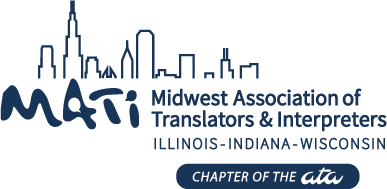11th MATI Annual Conference
by Federico Vinas
Federico Vinas is a Spanish Certified Healthcare Interpreter (CHI™) working with pediatric patients in southern Wisconsin. He does on-site, over-the-phone, and video interpreting.
The 11th MATI Annual Conference, held on Saturday, September 20, 2014, was a successful event addressing relevant and important topics in the fields of interpretation and translation. The presentations were “Web 2.0, Mobile, and You,” “Interpreting in Pediatrics,” “Courtroom Dilemmas for the Court Interpreter” and “The State of the Language Service Industry,” presented by renowned members of our translation and interpretation communities.
1. Web 2.0, Mobile, and You: 21st Century Technology for Interpreters and Translators, by Katharine Allen, M.A., Co-President, InterpretAmerica.
Ms. Allen presented one of the most vital topics for every interpreter and translator who wants to continue evolving in the profession. Technology is reaching into every aspect of the interpreter/translator’s work, including daily tasks, continuing education, advertisement, and resources, and we must stay current with new developments and opportunities, remain open to updates and offer the best service. This intricate technological world should be viewed as an advantage–as a better way to communicate and improve ourselves, not as a challenge.
Web 2.0 is enabling new forms of communication, collaboration and learning never seen before. These tools can help us create new venues for training, resources and education and access and share these from the comfort of our homes, offices or even around the globe.
2. Interpreting in Pediatrics: Building Blocks for Success, by Jennifer Flamboe, M.A., CHI, Chair, World Languages, and Director of Healthcare Interpretation, Alverno College.
Ms. Flamboe presented the broad field of pediatrics, including topics such as physical, emotional and social development and the well-being of babies, children and adolescents. She said that the interpreter must prepare for many different subjects not only in primary care pediatrics but in every branch of medicine, such as cardiology and podiatry. She also addressed the proper utilization of techniques, modes and roles of interpretation and how these are crucial in pediatric environments. Additionally, she emphasized the importance of Standards of Practice and the Code of Ethics. The interpreter must always maintain register, tone and spirit in every encounter, respect everyone’s ideas and avoid judgmental thinking, all while promoting transparency. Pediatric encounters require specific communication techniques to promote successful communication with children at their developmental level and tend to look different from adult encounters.
3. Courtroom Dilemmas for the Court Interpreter, by Alexandra Wirth, M.A., Federally Certified Court Interpreter and Wisconsin Supreme Court Certified Interpreter.
Ms. Wirth presented a complete and detailed list of the court interpreter’s role and the tenets by which a court interpreter should abide. She gave numerous examples of the appropriate solutions to common dilemmas that a court interpreter faces while performing his or her duties.
The definition of a court/legal interpreter is not to represent the interest of any party involved. The definition is not translator, advocate, social worker, helper or tour guide, liaison, attorney, etc. The definition of a court interpreter is “a court employee who has the ability to render a complete and accurate interpretation of what is said in court from English into the target language, without altering, omitting or adding anything to what is stated or written and without explanation.”
The interpreter is an honest, ethical, responsible professional who prepares, improves and cares for his/her profession. The interpreter should always promote the interpreter’s role, including scope and etiquette.
Ms. Wirth also described the proper guidelines for interpreting in a court setting, including how to approach the judge, how to approach all other parties and how to work with a colleague or in a group. Teamwork is essential in the legal setting. Working with a colleague can create friction or conflict, but setting rules such as breaks, signals, terminology, preparedness and solving discrepancies beforehand may avert many potential disagreements.
4. The State of the Language Service Industry: 2014, by Hélène Pielmeier, M.A., Director of Industry Providers Services, Common Sense Advisory.
Ms. Pielmeier presented key findings and answered questions related to the Common Sense Advisory’s Language Services Market report for 2014. She looked at where market trends can be expected to take the language service industry in the near future. For example, CSA’s analysis of major corporate websites showed that 12 languages now reach 80% of the online population, but the firm predicts that 20 languages will be needed in the future. Research also found that freelancers and LSPs hold sharply different views about the correlation between price and quality. And while Ms. Pielmeier said freelancers do not run the risk of being replaced by machines, she did say they may be replaced by people who are willing to do post-editing of machine translations.
(More in-depth looks at each of the four presentations are forthcoming in the Fall 2014 and Winter 2015 issues of inforMATIon. They will also be posted to the MATI blog: http://www.matiata.org/blog.)
